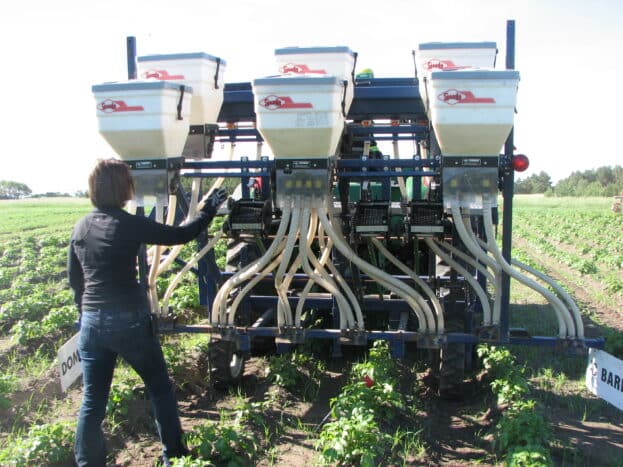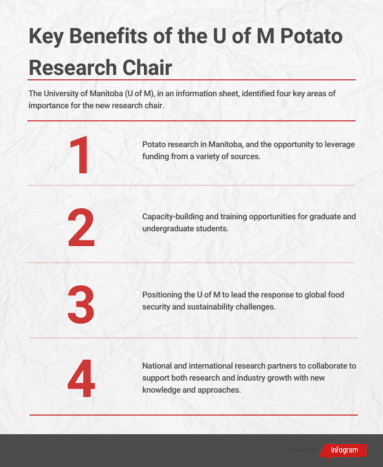The future U of M Research Chair in Potato Sustainability will drive forward Manitoba potato research work.
The University of Manitoba (U of M), along with growers and industry partners, is fundraising for a Research Chair in Potato Sustainability. The new position will help the Manitoba potato industry tackle key goals relating to sustainability while also engaging in field-level research.
The idea for a research chair was born from a 2022 report made by the Manitoba Potato Research Committee (MPRC). The MPRC represents the Manitoba potato industry with representation from across the industry, including collaborative relationships with other programs doing research and extension work in the province. In January 2022, MPRC recommended in the Potato Science and Technology Strategy final report that a potato research chair should be established at the U of M with a focus on sustainability.
“Having a position leading potato and horticulture research while supporting industry-led initiatives and creating pathways for knowledge transfer between academia, industry, and growers will be a first for the university,” explains Nazim Cicek, associate dean of research in the Faculty of Agricultural and Food Sciences at the U of M.

The proposed research chair is gathering support from across the industry including from Peak of the Market and the Keystone Potato Producers Association (KPPA). Peak of the Market is a fresh potato and vegetable supplier in the province, while KPPA represents potato growers from across the province.
“The positive industry response is signaling how important it is becoming to increase the capacity for students to work in applied research and extension programming. Working closely with other research programs, both private and post-secondary, the research chair will raise the profile of potato production and processing in Manitoba,” explains Cicek.
As a broad term, sustainability can sometimes be seen as a catch-all phrase, but the role of the chair will become clearer as the recommendations of the MPRC report are realized during the establishment of the research chair position, explains Tracy Shinners-Carnelley, vice president of research, quality and sustainability at Peak of the Market.
“This was a key point within the report and critical as we fundraise and develop the structure for the chair,” she adds.
Another important focus of the research chair will be working with U of M students to learn about the potato industry.
“It is important to train people for the potato sector from lab to plot, field to the processor, and to do that we need courses and experiential learning opportunities for our students. Many faculty members have worked with the potato industry,” explains Cicek “With a dedicated research chair we can help our degree and diploma students as well as our graduate students have better opportunities while bringing innovation to growers and industry.”
Manitoba has a lot to offer those interested in potato research, including well-established production and processing, growers interested in sustainable practices, and a strong history of post-secondary research collaboration, a handout from the U of M says. There’s a desire to increase potato research capacity at the U of M and bring together other partners to tackle some of the big challenges ahead for food security and sustainable production.
When industry and post-secondary work together on research-driven projects it can increase ways to leverage funding, increase reach, and facilitate knowledge transfer, says Cicek. This is the first potato-specific research chair for the university and the province of Manitoba. It will be only the second dedicated potato research chair in Canada, with the first being at the University of Lethbridge.

Unique to the position, which the U of M is targeting to be filled in the fall of 2023 or early 2024, will be the focus on sustainability for the industry, which is explained in the January 2022 Manitoba Potato Science and Technology Strategy report. The sustainability focus covers a lot of ground, including soil and water health, integrated pest management, and finding ways to reduce the carbon ‘footprint’ of production and processing.
According to provincial stats from the U of M, Manitoba potato growers increased their production by almost five per cent in 2021 with close to 80,000 acres in production. Last year Manitoba led the country in tonnage, followed closely by Alberta. Most acres are dedicated to processing potatoes, 80 per cent of which are exported, with the remaining acreage split between seed, chip, and fresh potatoes. Potatoes are the fourth most valuable crop grown in Manitoba.
“At Peak of the Market we see the positive industry response to the research chair as a signal that there’s a desire to move Manitoba forward as a leader in both potato production but also research in this key crop,” says Shinners-Carnelley. “The industry supports research — research gives us things that growers can use. The industry engagement has been a huge driver.”
The U of M has identified several key components for potato research in the province. All focus on supporting sustainability in production and processing — this is critical as Manitoba looks to expand the number of acres in potato production, especially for processing, fresh, and seed.
Industry partners, like KPPA, are also looking at ways the research chair will connect with growers, and provide field-level, actionable ways to improve the sector. KPPA supports the role and is involved with ongoing fundraising activities toward establishing the research chair but wouldn’t comment further on the work ahead for the establishment of the research chair.
For more information on the potential research chair visit the U of M website.
Related Articles
Peak of the Market Gives Funds for U of M Potato Sustainability Chair
U of M Receives Funds to Updated Facilities for Potato Research








